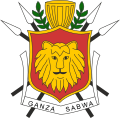Kingdom of Burundi
| Uburundi | |||||
| Kingdom of Burundi | |||||
| 15th century - 1966 | |||||
|
|||||
| Motto : Imana, Umwan, Uburundi ( German God, King and Burundi ) | |||||
| Official language |
Kirundi from 1890 German from 1922 French |
||||
| Capital | Gitega (royal city) | ||||
| Form of government | monarchy | ||||
| Head of state , also head of government | lastly King Ntare V. | ||||
| surface | 27,834 km² | ||||
| population | 3,275,000 (1966) | ||||
| Population density | 117.7 inhabitants per km² | ||||
| currency |
German East African Rupee (1890–1916) Congo Franc (1916–1960) Rwanda-Burundi-Franc (1960–1964) Burundi-Franc (1964–1966) |
||||
| founding | 15th century | ||||
| independence | 1962 | ||||
| resolution | 1966 | ||||
| National anthem | Burundi bwacu | ||||
| Location of the Kingdom of Burundi in East Africa | |||||
The Kingdom of Burundi is a historic state in the east of the African continent.
The state, which had existed since the 15th century, comprised the historical region of Urundi , which was largely identical to today's Burundi . The kingdom existed until 1966, making it the predecessor of the Republic of Burundi that exists today .
The country was ruled mainly by kings from the Tutsi ethnic group .
history
The first legendary Mwami ("ruler") of Burundi was King Ntare III. Rushatsi , who ruled from 1680 to 1709. On July 1, 1890, the kingdom was formally incorporated into the German colonial territory of German East Africa . The largely indirect rule of the German Empire over Burundi existed from about 1897 to 1916, when Belgian-Congolese troops marched in during the First World War . On July 20, 1922, Burundi and the neighboring Kingdom of Rwanda became part of the Rwanda-Urundi League of Nations mandate . It received internal autonomy on December 21, 1961 and regained its independence on July 1, 1962. Parliamentary elections were held in Urundi on September 8, 1961 . The first prime minister since regaining independence in 1961 was Joseph Cimpaye .
The last King Ntare V ruled from 1966, but was planned to be killed in the same year by republican putschists at the Ibwami ( court ) in the capital Gitega . He fled into exile in the Federal Republic of Germany in good time . The last Prime Minister (from 1966) until the abolition of the monarchy on November 28, 1966 was Michel Micombero , who then declared himself president.
Aftermath
Most of the members of the royal family live in France these days .
In the 2005 elections, Princess Esther Kamatari ran for the presidential election as the top candidate of the Abahuza party ( German party for the restoration of the monarchy and dialogue in Burundi ). Political proponents in the country argue that restoring constitutional monarchy could help ease tensions between ethnic groups as the monarchy could become a symbol of unity.
Symbols
See also
Individual evidence
- ↑ Helmut Strizek: Donated colonies - Rwanda and Burundi under German rule. Ch. Links Verlag, Berlin 2006, ISBN 3-86153-390-1 .





